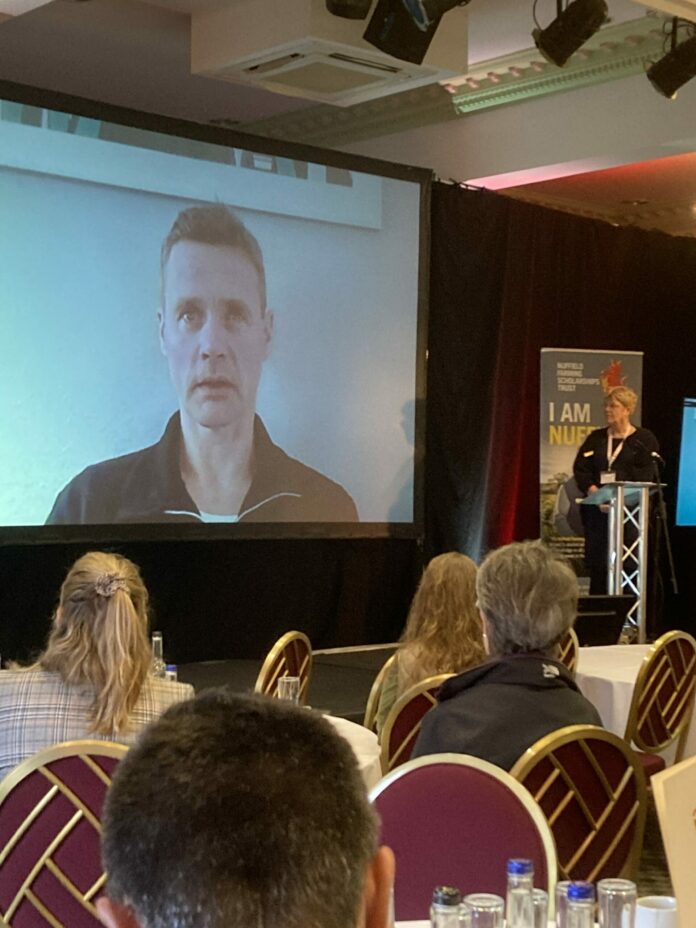Author: Aaron de Long
As we shared last month, Pasa’s Aaron de Long headed to Europe in early March for the Nuffield International Farming Scholars annual conference. This month, Aaron shares the story of a farmer who joined the conference remotely from Ukraine, where Russian military action had begun just days before. Ukraine is by no means the only country where violent conflict prevents farmers from tending to their land, but this crisis is a powerful example of how security of our global food system, and society as a whole, is deeply interconnected with our farming practices.
The 2021 and 2022 Nuffield Scholars gather at the British Parliament for a policy discussion with members of the House of Lords and the House of Commons.
Nuffield’s annual conference brings together over 120 farming scholars from more than a dozen countries representing every continent except Antarctica to share their stories, research ideas, and inspirations toward a better tomorrow not only for farmers and food, but for the wider society and world. This year there was an unexpected and distressing backdrop to the meeting—the war in Ukraine.
Our scholar group was privileged to have a video conference with Kees Huizinga, a Dutch immigrant to the Ukraine who has been farming thousands of acres there for decades. Kees spoke of the night the bombings began in his region, of the doors rattling in his home due to the shockwaves of nearby shells, and of telling his children, awakened by the onslaught, that it was war.
He sounded a desperate plea to everyone present to work and try to create real interventions in Ukraine to save not only his people, but also their farms and crops.
Kees Huizinga, a Dutch immigrant to the Ukraine spoke with Nuffield scholars about the impact of the conflict on the nation’s farming communities and agricultural production.
“The time to sow wheat is now,” Kees explained, “but farmers are afraid to work their land…their tractors are targets, and their fields have become battlegrounds.”
Everyone in attendance felt, not only the deeper reality of the terrible suffering occurring, but also the practical reality of the coming scarcity in food as the breadbasket of Europe, and arguably the world, was laid siege to. In the coming days, we would also learn that the agricultural solutions to a looming grain shortage are not as simple as some might think.
At this time, some weeks later, the situation in Ukraine remains difficult and unpredictable. Many Ukrainian farmers did miss their planting windows for wheat and other crops, and many others remain threatened by war. The ability for the country to export what might be harvested in months to come is uncertain, and the predicted scarcity in many food crops for the European and world markets later this year is now nearly certain to occur.
As a response to these developments, President Emmanuel Macron of France recently declared that “agricultural independence” for his nation would now take priority over the sustainable farming goals laid out in the European Union’s Green Deal, and practices emphasizing production and food security would trump conservation and environmental concerns. Although this is an understandable response to this crisis, agricultural independence for the French does not necessarily address the scarcity issues that will likely arise in the Middle East and Africa this year, who are heavily reliant on Ukrainian imports and, next to the Ukrainian people, may be the ones who suffer the most from the results of this war.
Nuffield scholars from Kenya spoke at the conference about decreasing yields in their region over the last several years due to climate change, a shift in precipitation patterns and temperatures that is in no small way being driven by farming practices that value short term, input intensive yields, over the long-term building of natural capital and resources. In this sense, the short-term policy response from Macron could, over the long term, only exacerbate food security issues, and the resultant migrations that often arise due to food shortages in Africa, for instance, may very well wind up on the doorstep of Europe.
Ultimately, if our production systems are in conflict with the preservation and enrichment of our natural resources, are they really taking us to a place of food security? Or are we creating a future where the very building blocks of life, such as soil and water, become scarce; where farming becomes increasingly impossible and conflict becomes inevitable?
The powerlessness everyone felt when Kees made his pleas was frustrating and real, and the French solution to coming shortfalls in commodities is understandable and perhaps even necessary in the moment, but our real hope for the resolution of such conflicts has to lie in their prevention, which may only come from a sea-change in our culture, itself. Such a change may manifest in myriad forms, depending on where we stand in society and how we interact with the world, but as farmers it must come as an agriculture focused on regeneration and union, and collaboration and peace, both with the natural world, as well as one another. Such a cultural change, like building good soil or growing a forest, requires a long-term perspective and goals, but is essential for realizing a truly secure food system and society.
Kees Huizinga is part of a Dutch foundation that provides humanitarian aid for Ukraine, which can be found at deleeuwkiev.nl.
Ukraine is one of many countries where violent conflict is disrupting food systems.
